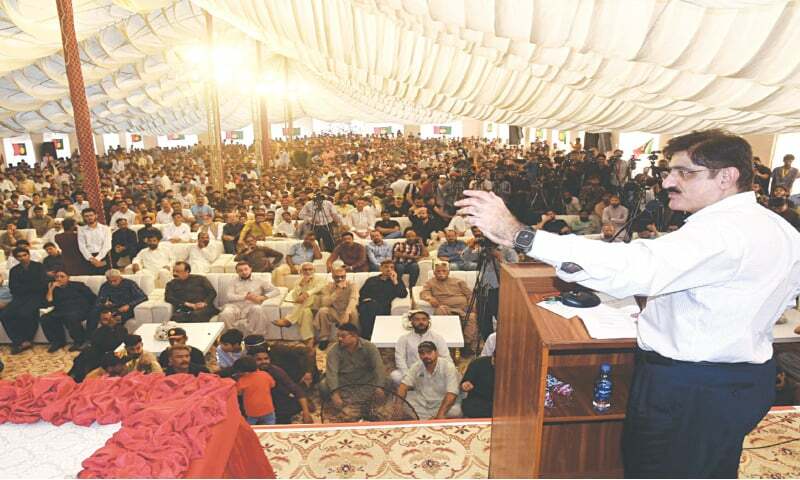
[ad_1]

KARACHI: Sindh Chief Minister Syed Murad Ali Shah on Tuesday inaugurated major road and energy projects worth Rs6 billion across the city and declared that those initiatives reflected his government’s commitment to improving infrastructure and embracing the idea of renewable energy to benefit the people of Karachi.
During his five-hour-long visit to different parts of the metropolis, he inaugurated a football ground in district East, three road projects in districts West and Central and solarisation of the Central Jail Karachi and Dow University of Health Sciences.
He said those initiatives were aimed at enhancing the city’s recreational facilities, road infrastructure and energy sustainability.
The CM was accompanied by his cabinet members, including Sharjeel Memon, Nasir Shah, Saeed Ghani, Ali Hassan Zardari and Waqar Mahdi.
Central prison, DUHS Ojha campus converted to solar energy
One of the key projects inaugurated was the newly-rehabilitated Shaheen Football Ground and a park in Manzoor Colony. The project, which cost Rs213 million, was part of the CLICK schemes for fiscal 2022-23.
During the inauguration, the football ground event turned into a public meeting which the chief minister addressed.
He announced that his government had launched a 400 MW solar power project, with the solar project in Karachi being at an advanced stage.
The CM said his government would not rely on the National Transmission and Dispatch Company (NTDC) for the transmission of solar power from the Solar Park being established at Manjhand, and would instead lay a provincial transmission line.
Additionally, 50 government buildings were provided with solar energy in the first phase of solarisation, and in the second phase, Dow University Hospital, Ojha Campus, and Central Jail Karachi had been solarised.
“Both projects are expected to recover their investment cost within two years,” he said and added that the government had also initiated a project to provide home solar systems to 200,000 households and was working on a 400 MW solar power system at Keenjhar Lake.
The chief minister said that Thar coal-fired projects were producing the low-cost power in the country.
“A railway line from the Thar coal field to the main line at Chhor is being laid to facilitate the transportation of coal to other power projects in the country to produce inexpensive electricity,” he said.
Talking about the passage of the 26th Amendment, the chief minister credited PPP chairman Bilawal Bhutto Zardari for his role and expressed the hope that he would become the next prime minister of Pakistan.
He also said chairman Bilawal had proved himself to be a great and youngest statesman and politician, and mentioned the importance of judicial reforms and the efforts made by him in this regard.
The CM also commented on a judge’s remarks about the law and order in Sindh, expressing his surprise and pointing out that other provinces also faced similar or worse law and order situations.
He claimed that comparatively, Sindh had a better law and order than other provinces.
Those who spoke on the occasion included provincial ministers Nasir Shah and Saeed Ghani, Sindh Assembly Deputy Speaker Anthony Naveed and PPP provincial secretary general Waqar Mahdi.
Road infrastructure
The CM inaugurated three crucial road projects in districts West and Central.
The reconstruction of Mirza Adam Road, a 1.6 km dual carriageway, was completed for Rs901m. This road, which connects Sher Shah Chowk to Mirza Adam Khan Road, includes a storm water drainage system to prevent flooding.
Café Piyala Road, a 4.05 km dual carriageway linking Sakhi Hassan to Rashid Minhas Road, was constructed for Rs9.753m. This route provides easier access to important healthcare facilities such as Cardio Hospital and Mamji Hospital.
Shahrah-i-Noor Jahan Road, another significant project, now offers a 6.1 km main dual track and a 4.35 km dual service track, constructed for Rs3,367.735m. This road will ease traffic flow through North Nazimabad and North Karachi, providing a vital alternative to Shahrah-i-Sher Shah Suri.
Solarisation of key public buildings
In a move towards sustainable energy, the CM inaugurated solar energy projects at Dow University Hospital, Ojha Campus, and Karachi central prison.
The hospital has been provided with 2.32 MW of solar power, part of a Rs290m project, that is expected to generate significant savings over the next 25 years. Twelve key hospital buildings, including the OT ward and digital library, have been equipped with solar panels.
Similarly, Central Jail Karachi now benefits from a 614.8 KW solar energy system, with surplus energy being sent to the KE grid under net metering regulations. The project, costing Rs216m, will pay for itself within three years and is expected to generate annual savings of Rs64.26m.
Published in Dawn, October 23th, 2024
[ad_2]
Source link






